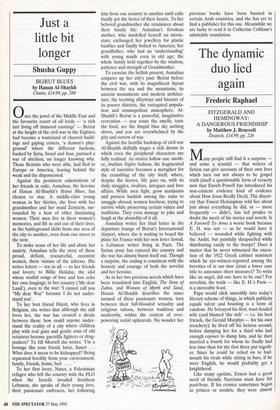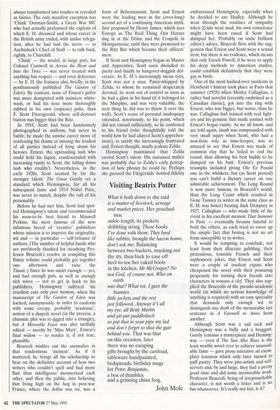The dynamic duo lied again
Frederic Raphael
FITZGERALD AND HEMINGWAY: A DANGEROUS FRIENDSHIP by Matthew J. Bruccoli Deutsch, £14.99, pp. 226 Many people still find it a surprise and some a scandal — that writers of fiction can give accounts of their own lives which turn out not always to be gospel truth (itself a questionable form of veracity now that Enoch Powell has introduced his non-existent evidence kind of evidence about How Jesus Really Died). The discov- ery that Ernest Hemingway told lies about just about everything he did, or — more frequently — didn't, has led prudes to doubt the merit of his stories and novels. Is A Farewell To Arms a worse book because E. H. was not — as he would have it believed — wounded while fighting with the Arditi, but painfully shrapnelled while distributing candy to the troops? Does it matter that he never witnessed the execu- tion of the 1922 Greek cabinet ministers which he eye-witness-reported among the brevities of in our time (trust a lower case title to announce short measure)? To write like an angel, did one have to be one? For novelists, the truth — like E. H.'s Paris is a moveable feast.
Papa would click smoothly into today's literary scheme of things, in which publicity equals talent and boasting is a form of candour. He betrayed his first, trust-funded wife (and blamed 'the rich' — i.e. his best friends, the Gerald Murphys — for his own treachery); he lived off his heiress second, before dumping her for a third who had enough cojones to dump him, and he then married a fourth for whom he finally had less time than for the first three put togeth- er. Since he could be relied on to bad- mouth his rivals while sitting in bars, if he were English, he would probably get a knighthood. Like many egotists, Ernest had a great need of friends; Narcissus must have his pool-boys. If his cronies sometimes began as princes or models, they were almost always transformed into toadies or revealed as fairies. The only manifest exception was `Chink' Dorman-Smith, a Great War MC who had actually performed the exploits of which E. H. dreamed and whose career in the British army ended, with undue relega- tion, after he had had the nerve — as Auchinleck's Chief of Staff — to talk back, rightly, to Churchill.
`Chink' — the model, in large part, for Colonel Cantwell in Across the River and Into the Trees — was never treated with anything but respect — and even deference — by E. H. (he features also, briefly, in the posthumously published The Garden of Eden). By contrast, none of Ernest's galere was more denigrated with insincere white- wash, or had his nose more thoroughly rubbed in his own (copious) puke, than F. Scott Fitzergerald, whose self-destruct button was bigger than the Ritz.
In 1918, Scott had been handsomely photographed in uniform, but never in battle; he made the unwise career move of confessing his shame at missing the loudest of all parties instead of lying about his heroics. Ernest, the upstanding lush who could hold his liquor, condescended with increasing vanity to Scott, the falling down lush who couldn't. Nevertheless, in the early 1920s, Scott seemed by far the stronger talent: The Great Gatsby set a standard which Hemingway, for all his subsequent fame and 1954 Nobel Prize, was never to match, despite the cult of his personality.
Before he had met him, Scott had spot- ted Hemingway's talent and recommended his soon-to-be best friend to Maxwell Perkins, the most famous of the now infamous breed of 'creative' publishers whose mission is to improve the originality, wit and — in particular — self-reliance of authors. (The number of helpful hands who are prefatorily thanked for steadying Pro- fessor Bruccoli's resolve in compiling this flimsy volume could probably get together one afternoon and raise the Titanic.) Since he was smart enough — yes, and had enough guts, as well as enough rich wives — not to get in hock to his publishers, Hemingway suffered his cruellest cuts only post mortem, when the manuscript of The Garden of Eden was hacked, anonymously, in order to conform with some creepy, probably 'academic', notion of a shapely novel (in the process, a chiasmic plot was re-jigged into a triangle), but A Moveable Feast was also tactfully edited — mostly by 'Miss Mary', Ernest's final widow — to render it, if not true, plausible.
Bruccoli winkles out the anomalies in that tendentious 'memoir'. As if it mattered, he brings all his scholarship to bear on the definitive account of how two writers who couldn't spell and had more flair than intelligence mesmerised each other, and then the public, into believing that living high on the hog in post-war France, where the dollar was roi, was a form of Bohemianism. Scott and Ernest were the leading men in the (over-long) second act of a continuing American myth, first proposed by Henry James, which sees Europe as The Real Thing. Our Heroes dug in at the D6me and the Coupole in Montparnesse, until they were promoted to the Ritz Bar which became their officers' mess.
If Scott and Hemingway began as Master and Apprentice, Scott soon dwindled to parity and finally to hangover-doggish def- erence. In E. H.'s increasingly mean eyes, Scott was not a man. Pussy-whipped by Zelda, to whom he remained desperately devoted, he went out of control as soon as he had a glass in his hand (if it belonged to the Murphys, and was very valuable, the next thing he did was to throw it over the wall). Scott's sense of personal inadequacy extended, notoriously, to his penis, which did not extend sufficiently, so he confessed to his friend (who thoughtfully told the world how he had allayed Scott's apprehen- sions), to satisfy the increasingly frustrated and, Ernest thought, madly jealous Zelda.
Hemingway maintained that Zelda envied Scott's talent. His sustained malice was probably due to Zelda's early percep- tion of how phoney he could be. Perhaps she guessed the Fitzgeralds' bottled fidelity
Visiting Beatrix Potter
What it boils down to she said is a matter of livestock, acreage and market prices. Her pouched mac ankle-length, its pockets dribbling string. Those books I've done with them. They bred like rabbits, brought the bacon home, don't ask me. Balancing between two buckets, mucking out the sty, then back to ease off heel-to-toe her caked boots in the kitchen. Mr McGregor? No not God, of course not. Who on earth was that? What rot. I gave the bunnies little jackets and the rest just followed. Anyway it's all my eye, all Betty Martin and pit pat puddleduck so put that in your pipe my lad and don't forget to shut the gate behind you. That was that on this occasion, later there was no escaping gifts brought by the cartload, tableware handpainted, bedspreads, birthday mugs for Peter, Benjamin, a box of thimbles and a grinning china frog.
John Mole
embarrassed Hemingway, especially when he decided to axe Hadley. Although he went through the routines of sympathy when Zelda went mad, his own conscience might have been eased if Scott had dumped her. Probably on some brilliant editor's advice, Bruccoli flirts with the sug- gestion that Ernest and Scott were a sexual item, but there is no evidence, which means that only Enoch Powell, if he were to apply his deep methods to American studies, could establish definitively that they were gay as birds.
One of the most hashed-over incidents in HemScott's history took place in Paris that summer (1928) when Morley Callaghan, a rather bad novelist (recently enshrined as a Canadian classic), got into the ring with Ernest, who was bigger, but worse, than he was. Callaghan had trained with real fight- ers and his genuine fists made contact with Ernest's bogus vanity. As we all know, and are told again, insult was compounded with very small injury when Scott, who had a non-fistic role as time-keeper, was so amazed to see that Ernest was made of common clay that he failed to end the round, thus allowing his best buddy to be dumped on his butt. Ernest's previous triumphs included giving Ole Ez Pound one in the whiskers, but (as Scott proved) you can't build a literary career on one admirable achievement. The Long Round is now more famous, in Bruccoli's world, than the Long Count which resulted in Gene Tunney (a writer in the same class as E. H. was boxer) beating Jack Dempsey in 1927. Callaghan — who made little of the event in his excellent memoir That Summer in Paris — eventually became hateful to both the others, as each tried to cover up the simple fact that boxing is not an art form susceptible to re-writes.
It would be tempting to conclude, not least from their illiterate gabbling, their pretentious, touristic French and their sophomoric jokes, that Ernest and Scott were a couple of insolent expats who cheapened the novel with their posturing propensity for turning their friends into characters in romans a clef. They also sup- plied the Bruccolis of the pseudo-academic world (in which no serious knowledge of anything is required) with an easy speciality that demands only enough wit to distinguish one draft of the memorable last sentence in A Farewell to Arms from another.
Although Scott was a sad sack and Hemingway was a bully and a braggart, Gatsby remains a masterpiece and Heming- way — even if The Sun Also Rises is the least worthy novel ever to achieve unassail- able fame — gave prose narrative an exem- plary leanness which only later turned to puff pastry. They were piss-artists and self- servers and, by and large, they had a pretty good time and did some memorable work. Professor Bruccoli, being of irreproachable character, is not worth a letter and is no fun whatsoever. It's really not fair, is it?



































































 Previous page
Previous page